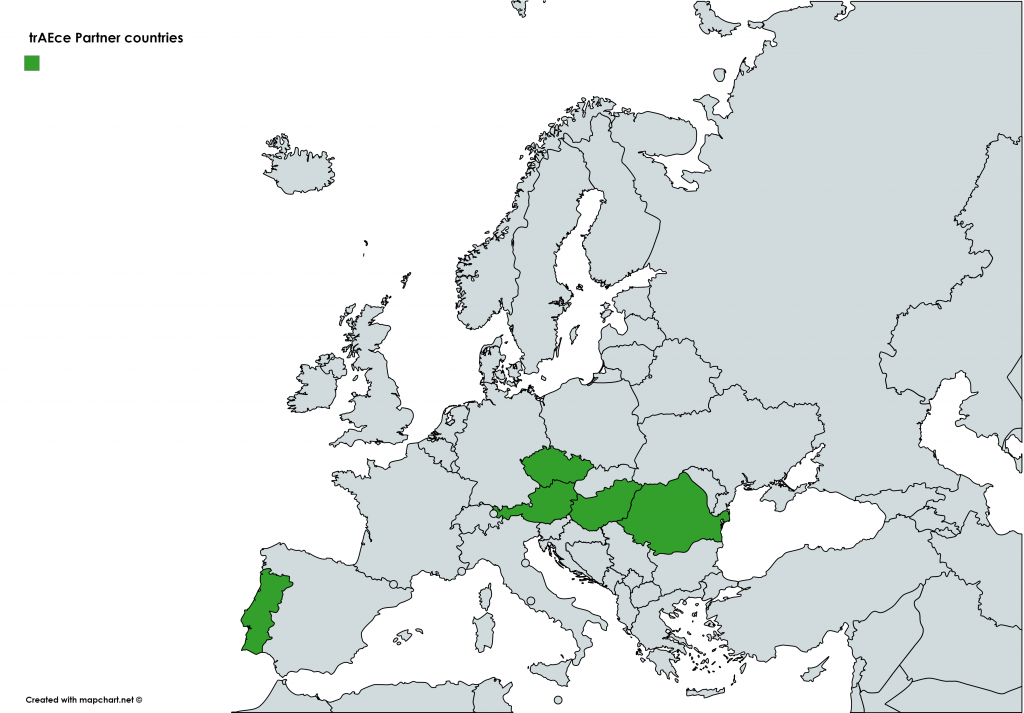trAEce is a three-year-long capacity building, knowledge development and strategic partnership project funded by the Erasmus+ programme. The projects is farmer centered and its main aim is to offer farmers and their trainers with competency-based training skills and tools to ensure that they adapt their agricultural practice towards agroecological (AE) practices. The project aims at smooth transition from conventional industrial agriculture towards ecologically friendly practices in the near future. The road to realization of such ecologically friendly practices can be built upon a strong knowledge and capacity development.
trAEce novelty surrounds its strong consortium which pools together the experience and expertise of 6 prominent institutes with different institutional structures from 5 European countries (Hungary, Romania, Austria, Czech Republic, Portugal). One unique and outstanding characteristic of the consortium is that the partners strongly uphold the holistic approach of AE that can be reflected in practice.

Outputs
The project desires to create four major intellectual outputs to ensure that farmers and trainers are equipped with the right skills, attitudes, and wits for transforming the agricultural sector towards an agroecological driven sector. The desire for an agroecological driven Europe remains the passion for each member of the consortium. Agroecology in Europe has for a long time been operating under the background but in the past decade, its significance is growing at an unprecedented rate. this growth has been accelerated by the change in consumer behaviors and patterns with large p[opulationsd being aware of the environment than Before. In Europe, Agroecology in the Western and Northern Europe is more deeprooted while in the Central, southern and Eastern its gaining momentum.
1. Agroecology Situation analysis in partner countries
The main objective of this Intellectual output is to effectively assess the situation of current agroecological practices in the Partners countries. In order to be able to equip the farmers with the right skills, there is a need to identify the knowledge gaps in the agroecological sector, the farmer’s perceptions and attitudes towards agroecology. Once the wide image of agroecology has been identified, the right stakeholders and strong networking can be established to ensure further scaling up and replication of the desired practices. disseminate the right tools and skills, identifying the real scenario at the ground in partner countries is of great importance. Situation analysis is important because each country has its own specificities and the training modules and curriculum development, future policy, research, and development advice will be based on the outcome of the analysis. It outlines the roadmap for the project partners by offering the guidelines and the framework on how the other objectives are developed and disseminated.
3. Learning materials for AE training
The main objective of the Intellectual output is to achieve a competency-based training, learning by doing is crucial for farmers. This will be achieved by developing tangible outcomes where farmers can have a point of reference in future skills development. This will be achieved by creating and developing films and videos from different farm practices. these materials will form an archive for the farmers and their trainers where they can always enrich their know-how level.
2. Agroecological vocational training curriculum
The main objective of this output is to develop a coherent and comprehensive teaching curriculum that will be used for widening the scope for farmer training as well as knowledge transfer from generation to generation for the farmers to be. The curriculum will be very special based on the target group. Farmers are highly driven by profit-making from any activity they implement on the farm. Thus, the curriculum will be curtailed toward the farmer’s needs to ensure that its complex, diverse and goal-oriented aimed at enriching what the farmer already knows to ensure out of their adoption of new agroecological practices they are able to gain more income while becoming more aware of their ecology. The modules to be developed and disseminated are in line with farmers’ needs of improving their farm income while improving the ecological status of their gardens. For a smooth transition from conventional to agroecological practice, the farmer has to learn by doing and be convinced of the importance of adopting AE practices. The curriculum will be an important tool for the future and to be farmers especially the young generation who will be able to learn from the farm.
4. Methodological guide for trainers and educators
The main objective of this output is to ensure smooth dissemination and wide spreading of the desired skills to a wider array of audiences. Incorporation of experts and educators who are well versed with the desired practices forms the base for the output. Use manuals for different agroecological practices that will be developed, tested and validated by the experts. the strong incorporation of experts and educators to the training and manual development creates a strong synergy coupled with farmers’ expertise which enriches the manual and customizes it based on the farmer’s specificities.

